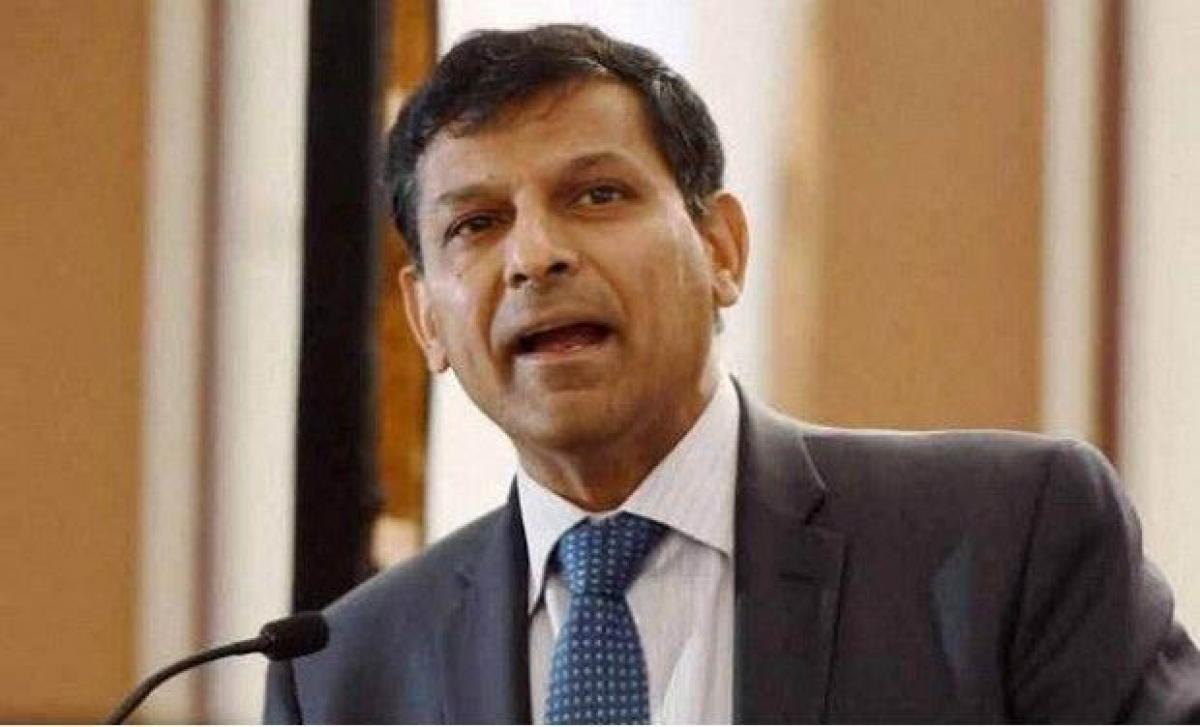Live
- Australian towns ordered to evacuate amid bushfire threat
- BJP backs LG's crackdown on illegal immigrants in Delhi
- AMR a global health threat, requires urgent action via one health approach: Anupriya Patel
- BJP planning big communal clash; we will expose them after Maha polls, says K’taka DyCM
- Sharad Pawar makes a soul-stirring plea 'to regain the glory of progressive Maharashtra'
- Seven soldiers killed in attack on Pak military camp in Balochistan
- ICC announces 2025 Men’s Champions Trophy tour to begin in Islamabad
- Americans increasingly vote along class lines, not racial ones: Report
- Chandrababu's brother Rammurthy Naidu Passes Away in Hyderabad
- Russia restricts enriched uranium exports to US
Just In

x
Highlights
Optimistic about the passage of long pending GST bill in the Parliament, Reserve Bank of India Governor Raghuram Rajan has told American investors that continued focus on fiscal consolidation and inflation will mean they will reach their targeted goal. In an interaction with American financial institutional investors in New York last week at an event organised by US India Business Council, Rajan said another priority of the RBI is to clean up banks and their non-performing assets.
Optimistic about the passage of long pending GST bill in the Parliament, Reserve Bank of India Governor Raghuram Rajan has told American investors that continued focus on fiscal consolidation and inflation will mean they will reach their targeted goal. In an interaction with American financial institutional investors in New York last week at an event organised by US India Business Council, Rajan said another priority of the RBI is to clean up banks and their non-performing assets.
Rajan said RBI's continued focus on fiscal consolidation and inflation will mean that they will reach their targeted goals, according to a USIBC media statement. Another priority is to clean up banks and their non-performing assets, he said. Intention is to give banks more powers to allow for greater recovery of money and give relevant stakeholders an active role in the resolution process, he observed.
During the interaction, Rajan said he is optimistic about the passage of GST and the opportunities for compromise that will help realise the goals of the GST - a unified tax market, improvement in tax collection and broadening the tax base, USIBC said. Led by USIBC chairman and president and CEO of MasterCard, Ajay Banga, the discussion focused on issues such as inflation and fiscal deficit management, recent rate cuts and monetary policy, deepening capital markets, modernising India's capital markets to mobilise investment in Indian infrastructure and world-class companies.
Industry's desire for reforms also included further development of a corporate debt market, improved infrastructure trusts and debt fund structures, long-term rupee-denominated government securities, and an updated external commercial borrowing regime, USIBC said. USIBC applauded the Indian government for its recent reform introduced in private sector banking that permits the total foreign holding in private banks to have a composite cap of 74 per cent and eliminates existing sub-limits for FDI and FII capital (which were at 49 per cent).
Banks and investors will have greater flexibility to raise capital and to meet the stringent capital adequacy norms. This reform is a critical step in supporting credit growth in the financial markets and the Indian economy, USIBC said. "As global commercial institutions and investors, we remain profoundly committed to India as we continue to provide a variety of long-term resources — including capital, technology, and know-how — which will help advance the Prime Minister's goals of financial stability, economic growth, digital access, and financial inclusion," Banga said.
USIBC president Mukesh Aghi said the Indian financial markets are an important driver for the country's economic growth. "There needs to be a level playing field for global participants in India's financial markets with clear, nationality-neutral regulations across all asset classes," he said.
More On

Next Story
More Stories
ADVERTISEMENT
© 2024 Hyderabad Media House Limited/The Hans India. All rights reserved. Powered by hocalwire.com







